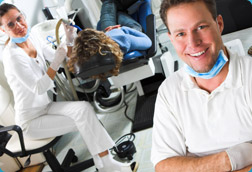Prosthodontists
When a dental patient is missing a tooth, it can potentially cause complications in the future. A missing tooth can mean that different stresses and strains are placed in the remaining teeth and on the jaw joints. This means that the remaining teeth can deteriorate at a faster rate than they normally would. It also means that additional strain on jaw joints can lead to unexplained aches and pains in the face, ache, neck and back.
A tooth can be lost for a number of reasons: due to decay, infection or to accidental damage and injury, for example. A prosthodontist is a specialist dentist who works with patients to find the right solutions to replace missing teeth.
What does the job involve?
A prosthodontist can employ a number of techniques and treatments to replace lost and missing teeth. Usually, a local dentist will refer a patient to a prosthodontist if they require major reconstructive, aesthetic or implant work. Therefore, the prosthodontist will consult closely with the patient and with their local dentist to understand patient requirements and to develop an appropriate solution. Usually, this solution will be made up of dentures, crowns, implants and supported restorations.
When replacing the missing teeth, the prosthodontist keeps four key criteria in mind. Is the oral health of the patient going to be maintained? Is the patient going to be comfortable with the replacements? Will the patient be able to function, ie/ talk, chew, swallow and breathe, adequately? And will the appearance of the replacements be satisfactory?
What qualifications do you need?
To become a registered dentist, you must gain a degree in Dentistry which usually takes a minimum of four years. You must register with the General Dental Council before you can begin practicing.
To adopt a specialism like prosthodontics, you will be required to study for at least a further two years. During this time you will build the skills, expertise and knowledge which can then be maintained throughout your career. The dental profession evolves quickly, so the learning curve is often continual.
What are the career prospects?
As your skills develop, you will be able to build your reputation as a specialist and grow your own customer base. For this reason, many prosthodontists go on to run their own small practices, doing a combination of private and NHS work. Alternatively, some prosthodontists work in hospitals as part of a broader medical team. There is the potential in the fuure to move up to Consultant level.
Featured Jobs
-
Example Job
- Salary:
- £24,000
- Location:
- Preston, Lancashire
Lorem ipsum dolor sit amet, consectetuer adipiscing elit. Nam nisl ipsum, interdum id, fermentum ut, convallis sed, tellus.
More Info -
Example Job
- Salary:
- £24,000
- Location:
- Preston, Lancashire
Lorem ipsum dolor sit amet, consectetuer adipiscing elit. Nam nisl ipsum, interdum id, fermentum ut, convallis sed, tellus.
More Info -
Example Job
- Salary:
- £24,000
- Location:
- Preston, Lancashire
Lorem ipsum dolor sit amet, consectetuer adipiscing elit. Nam nisl ipsum, interdum id, fermentum ut, convallis sed, tellus.
More Info
